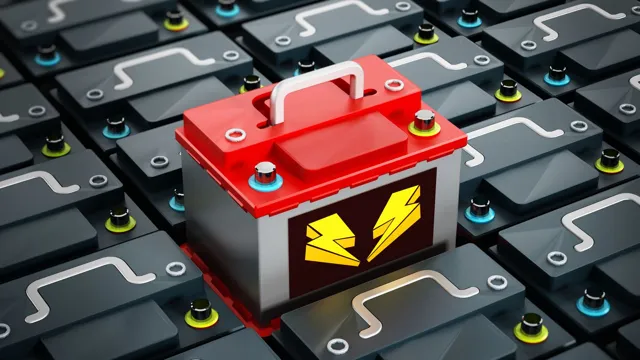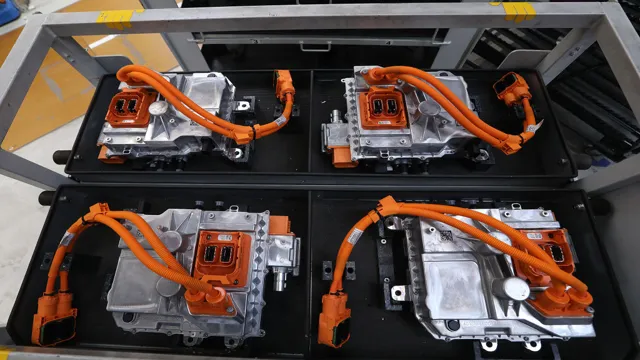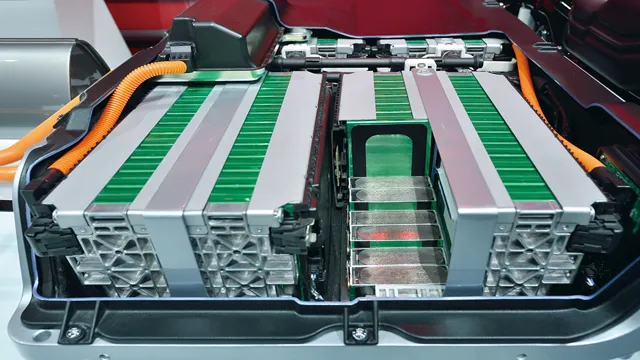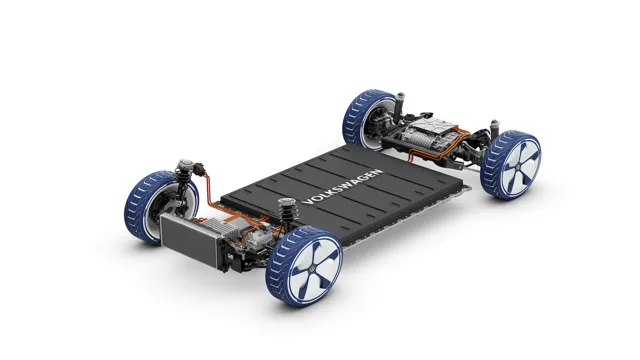From Landfill to Lifesaver: The Role of Electric Car Batteries in Sustainable Energy Solutions
Electric cars have been touted as the solution to the world’s increasing pollution problems. They are eco-friendly, quiet, and cost-efficient. However, there is a dark side to these electric vehicles that is seldom discussed.
While they may be better for the environment, there are still drawbacks that need to be considered. From the high initial cost to the environmental impact of the batteries, there are some serious concerns to be addressed. In this blog post, we’ll explore the dark side of electric cars and what you should consider before making the switch.
So buckle up, it’s time to take a closer look at the not-so-glamorous side of electric cars.
Electric Car Batteries End Up in Landfills
As the technological advancements in electric vehicles continue, one major concern that arises is what happens to their batteries at the end of their lifespan. Electric car batteries, like any other batteries, eventually lose their ability to hold charge over time and need to be replaced. While recycling or repurposing these batteries can be a viable solution, the sad reality is that many end up in landfills across the world.
With the amount of waste being produced, the landfills are filling up at an alarming rate, and adding more batteries to the mix will only make matters worse. The toxic chemicals and heavy metals present in these batteries pose a significant environmental risk, which can result in the leaching of harmful substances into the soil and groundwater. It is essential to find more sustainable solutions for these batteries to minimize their impact on the environment and reduce the e-waste crisis.
With incentives, policies, and technological advancements in place, we can create a sustainable future for electric vehicles while preserving the planet for future generations.
The Growing Problem of E-Waste
As electric cars continue to gain traction, concerns about the end-of-life disposal of their batteries are mounting. The batteries in these vehicles are made up of valuable materials, such as lithium and cobalt, that can be recycled. However, when these batteries are not properly disposed of, they end up in landfills and contribute to the growing problem of e-waste.
This is not only harmful to the environment, but it also wastes resources that could be repurposed. It’s important to understand that electric car batteries will eventually reach the end of their lifespan and we need to figure out how to ensure they are disposed of in an environmentally responsible manner. We can’t continue to ignore the problem of e-waste and deny the impact it has on our planet.
It’s time to start taking action and invest in sustainable solutions for the end-of-life disposal of electric car batteries.
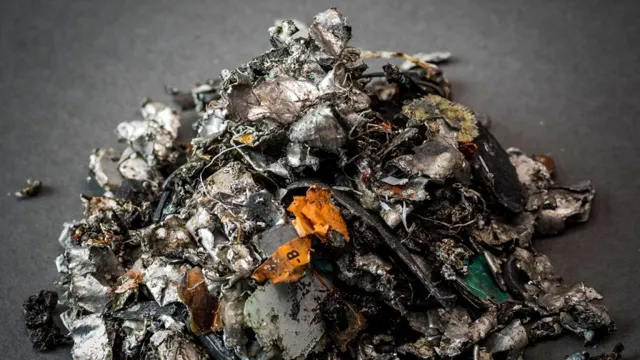
The Toxicity of Lithium-ion Batteries
Electric car batteries are becoming increasingly popular, but there is an issue with the way they are disposed of. When these lithium-ion batteries are no longer useful, they often end up in landfills, which can be incredibly harmful to the environment. The toxicity of these batteries can cause hazardous chemicals to seep into the soil and water, leading to contamination.
This poses a significant threat to wildlife and humans alike. Despite this, there are ways that we can minimize the environmental impact of these batteries. Many companies are starting to offer recycling programs for these batteries, which can help to reduce the amount of waste that ends up in landfills.
Additionally, researchers are working on developing more sustainable batteries that are less harmful to the environment. Overall, it’s important to be mindful of the impact that electric car batteries can have on the environment. By properly disposing of these batteries and investing in sustainable energy alternatives, we can help to protect our planet for future generations.
The Environmental Impact of Battery Disposal
The increasing popularity of electric vehicles has raised concerns about the environmental impact of battery disposal. Traditional car batteries are recycled, but electric car batteries are much large and more complex, making landfill disposal more common. These batteries contain toxic chemicals that can leach into the environment if not properly disposed of.
Landfills, already a major contributor to pollution, can be further impacted by the high volume of electric car batteries that will eventually need disposal. However, many companies are working on developing more sustainable solutions for battery disposal, such as recycling or repurposing the batteries for energy storage. It’s important for consumers to not only focus on the environmental benefits of electric vehicles but also consider the impacts of battery disposal.
By choosing responsible disposal methods and supporting companies with sustainable practices, we can work towards reducing the negative impact of electric car batteries on the environment.
The Landfill Solution
The environmental impact of battery disposal is a significant concern in today’s society. When batteries are not disposed of properly, they can pose a serious threat to the environment. One common solution for battery disposal is to send them to a landfill.
However, this method can have detrimental consequences. When batteries break down in a landfill, they release toxic chemicals that can contaminate the soil and groundwater. This can have severe implications for the wildlife and communities that surround the landfill.
Additionally, batteries can take hundreds of years to decompose fully, which means that they will continue to release toxins for a long time. Therefore, alternative solutions, such as recycling and proper disposal through certified facilities, are crucial to reducing the negative impact of battery waste on the environment. It’s essential to consider our choices and their impact on the environment, and simple changes like proper battery disposal can make a meaningful difference in preserving our planet.
The Recycling Solution
When it comes to battery disposal, many people overlook the severe environmental impacts that arise from improper disposal. Batteries contain harmful chemicals, such as lead, mercury, and cadmium, which can leak into the soil and water sources around them. This pollution can have a devastating effect on the ecosystem, leading to damage in the food chain and an adverse impact on wildlife.
In order to reduce these negative consequences, it is essential to recycle batteries properly. Recycling ensures that the materials can be extracted and reused, reducing the need for mining and manufacturing. By recycling batteries, we can greatly reduce the hazardous effects on our environment and safeguard the future health of our planet.
The Reuse Solution
The environmental impact of battery disposal cannot be ignored in today’s world. When batteries are improperly disposed of, they can release harmful chemicals into the environment. This can lead to pollution, soil contamination, and other environmental problems.
The solution to reducing this impact lies in battery reuse. By reusing batteries, we can keep them out of landfills and reduce the need for new batteries. Reusing batteries also reduces the demand for raw materials needed to manufacture new batteries, which helps to conserve natural resources.
Reusing batteries can be done in many ways, such as repurposing them for different uses or refurbishing them to extend their lifespan. So, the next time you think about disposing of old batteries, consider the reuse solution instead. By doing so, we can all play a part in reducing our environmental impact and preserving our planet’s natural resources.
What You Can Do to Help
If you’re concerned about the amount of electric car batteries that end up in landfills, there are a few things you can do to help. First and foremost, you can choose to rent or purchase electric vehicles with batteries that have been designed for longevity and can be recycled. You can also research manufacturers who prioritize sustainable materials and disposal methods when producing their batteries.
When it comes time to dispose of your battery, make sure to find a proper recycling facility instead of tossing it in the trash. Additionally, spreading awareness and advocating for sustainable practices in the automotive industry can make a big difference in reducing the overall impact on the environment. By taking these steps, you can help contribute to a more sustainable future for our planet while still enjoying the benefits of electric vehicles.
So let’s work together to reduce the amount of electric car batteries being sent to landfills and ensure a cleaner, healthier world for generations to come. Let’s protect our environment one battery at a time.
Reducing Your Carbon Footprint
Reducing Your Carbon Footprint is something we can all do to help the environment. There are many small changes you can make in your daily life that can make a big difference. One of the easiest things you can do is to reduce your energy consumption.
Unplug appliances and electronics when they’re not in use, turn off lights when you leave a room, and use energy-efficient light bulbs. Another way you can reduce your carbon footprint is by reducing your water consumption. Fix any leaky faucets or pipes and take shorter showers.
You can also switch to a low-flow showerhead and install a dual-flush toilet. Additionally, you can reduce your transportation emissions by walking, biking, or using public transportation instead of driving alone. Finally, you can reduce your food waste by buying only what you need, composting food scraps, and buying local and seasonal produce.
By making these small changes, you can reduce your carbon footprint and help the environment.
Properly Disposing of Batteries
Batteries are a vital part of modern life, powering everything from our phones to our cars. However, when it’s time to dispose of them, it’s important to do so properly. Improper disposal can lead to environmental damage, including groundwater contamination and potential fires.
So what can you do to help? One option is to recycle your batteries. Many cities and towns now offer battery recycling programs, making it easy to properly dispose of your old batteries. Another option is to look for rechargeable batteries, which can be reused multiple times and have a longer lifespan than disposable batteries.
By taking small steps to properly dispose of your batteries, you can help protect the planet and keep our communities safe.
The Future of Electric Car Batteries
As the shift towards electric cars becomes more prevalent, concerns have arisen about the environmental impact of the batteries required to power them. While electric cars are known to be more energy-efficient than traditional gasoline vehicles, the idea of thousands of discarded electric car batteries winding up in landfills is alarming. However, it’s important to note that many companies are working on ways to recycle these batteries once they are no longer useful for their original purpose.
Some are even developing second-life applications for these batteries, such as energy storage for homes and businesses. While the future of electric car batteries may still be uncertain, it’s clear that innovation and responsibility are at the forefront of many companies’ agendas. In the meantime, it’s up to us as consumers to make conscious decisions about our transportation choices and to dispose of our batteries properly.
Conclusion
In conclusion, electric car batteries ending up in a landfill is like ordering a gourmet meal and throwing away the leftovers. We have the technology to properly recycle and repurpose these valuable resources, so let’s not waste the potential for a cleaner, more sustainable future.”
FAQs
What is the environmental impact of disposing of electric car batteries in landfills?
The improper disposal of electric car batteries in landfills poses a significant risk to the environment. These batteries may contain toxic heavy metals such as lead, lithium, and nickel, which can leach into the soil and groundwater and harm wildlife and ecosystems. Additionally, disposing of these batteries in landfills can contribute to greenhouse gas emissions, as they may release harmful gases during the decay process.
How are electric car batteries recycled to prevent landfill pollution?
Electric car batteries can be recycled to prevent them from ending up in landfills. Recycling involves breaking down the batteries into their component parts and reclaiming the valuable materials, such as lithium and cobalt. These materials can then be reused in new batteries or other products. Recycling provides a more sustainable solution to battery disposal and helps to conserve valuable resources.
What is the lifespan of an electric car battery, and how does it affect landfill waste?
The lifespan of an electric car battery varies depending on several factors, such as the type of battery, driving habits, and environmental conditions. However, on average, electric car batteries can last up to 10 years or more. When these batteries reach the end of their lifespan, they must be disposed of properly to avoid further pollution of landfills. Proper recycling and disposal of these batteries can help to reduce the amount of waste generated and conserve resources.
Can using electric car batteries help to reduce landfill waste?
Yes, using electric car batteries can help to reduce landfill waste significantly. As more people switch to electric cars, there will be a greater demand for battery recycling and disposal programs, leading to increased sustainability in the transportation sector. Furthermore, electric cars are more energy-efficient than conventional gas-powered vehicles, which means they produce less waste and greenhouse gas emissions. Overall, the transition to electric cars represents a significant step towards a more sustainable and eco-friendly future.

